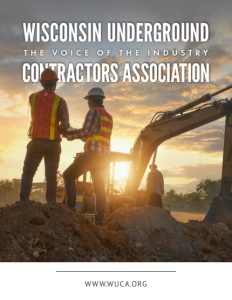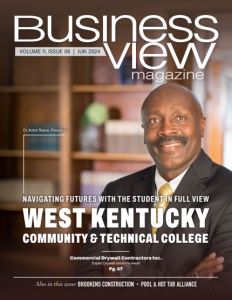Wisconsin Underground Contractors Association
The Voice of the Industry
Ensuring Safety, Technology Advancement, and Workforce Development
In the heartland of the US, the Wisconsin Underground Contractors Association (WUCA) has been a steadfast advocate for the underground construction industry since its inception in 1937. With nearly 90 years of history, WUCA has evolved from its early days as the Associated Public Works Contractors of Greater Milwaukee to a statewide organization that prioritizes safety, collaboration, and technological advancement.
“Ultimately, we’re the only organization in the state of Wisconsin that focuses on construction underground, which is a little bit of a different ballgame,” depicts Executive Director, Ruth Hackney. “The stakes are higher. If there are incidents or accidents, it puts our members and their employees at higher risk. If there’s a mistake that happens, the cost of repair is quite a bit higher than if it were something above ground. So, our goal is to have a positive relationship between our members, the unions, and the governing bodies to eliminate potential areas of tension or harm.”
WUCA’s core mandates revolve around two primary objectives, with safety being a priority. Hackney describes, “It’s really important to us that this industry, which holds high risks, is as safe as possible. We do that through training, through connections with government entities to ensure that specifications are up to date, and we have strong relationships with OSHA and other governing boards.”
Building and maintaining important partnerships is also key for the association, and integral to its functioning. “We have strong relationships with the Operators Union and the Laborers Union, where we are the third neutral party that’s helping the negotiations between the laborers and the contractors and employers themselves,” she explains, adding that WUCA also works closely with the city of Milwaukee and other municipalities in the state, promoting best practices.

Safety Initiatives
Hackney further highlights the importance of safety in underground construction, particularly when digging into areas where electric or gas lines could be present. “If they’re not properly located and if there’s a mistake that happens it could quite literally mean explosions,” she acknowledges. “So, it’s vital that we have a strong relationship with Diggers Hotline and our utility providers because being able to know exactly where a gas line or an electric line is, is critical to the safety of our members.”
Beyond the immediate dangers of mislocated lines, she underscores the broader risks associated with underground work, noting, “You often think it can’t be that big of a deal, but if there was a collapse of a tunnel, or if there was something that caught employees or workers underground, they are not only not going to have oxygen, but it would be catastrophic. The stakes are just so incredibly high for the workers.”
This heightened danger necessitates safety protocols, and WUCA maintains a close partnership with local OSHA. By staying up to date on regulatory changes, the association works to make certain that contractors prioritize safety at all times.
Hackney recounts, “It used to be that the organization itself was the primary provider of safety tools, safety training, that kind of thing, which is wonderful. But most of our contractors have recognized how important safety is, so much so that they now have at the very least a safety director, and many times entire safety teams, so that if there were an accident their team has systems and processes in place to ensure that the workers are taken care of to the best of their ability.”
Education and Advocacy Efforts
At WUCA, education and advocacy are pivotal aspects of its mission. Of course, safety remains the top priority, reflected in the hosting of 10 safety seminars annually, featuring events and presentations from entities such as OSHA, local fire departments, and Diggers Hotline. These seminars, shaped by input from contractor safety directors, cover essential topics like trench rescues and locate processes, providing firsthand demonstrations and practical guidance.
The association has also hosted its first annual Mental Health Awareness seminar, much needed in the industry.
“You think of contractors as these big burly men who don’t have any issues in the world when in reality, mental health is one of the number one issues that our contractors deal with,” Hackney relays. “That not only means potential loss of life if there’s depression or substance abuse, but it could also be as simple as somebody not being able to come to work because they just can’t get out of bed, and contractor work and construction work is hard work.”
In addition to safety education, WUCA cultivates a firm commitment to the community through networking and social events. Hackney shares that oftentimes members, though competitors, collaborate and support each other in times of need, exemplifying a level of camaraderie unique to the industry. “These are the only guys who understand what it means to work underground and the specific challenges that come with that. So, it is wonderful,” she portrays.
Furthermore, WUCA strives to enhance current specifications and reduce risks, participating in various boards and workgroups to secure the safety and efficiency of underground construction work. “We are doing a lot more in terms of advocacy and putting our members in front of municipalities and state governments to ensure that specifications are up to the highest standard, and that technology is utilized whenever possible to eliminate risks so that we don’t have to risk a human trying to figure it out. Because sometimes humans make mistakes,” says Hackney.

Technology and Workforce Development
Notably, technology plays a crucial role in enhancing safety and efficiency in underground construction. Hackney shares that innovations such as GPS tracking for utility lines and the use of GoPro 360 cameras for water line inspections have revolutionized the industry. “Technology also offers the ability to provide a safer work environment,” she conveys. “But the thing I think that we can sometimes forget as well is that technology can turn a job that needs 10 people into something that needs two people. So, utilizing technology can also help with some of the workforce shortages that exist.”
Workforce development is top of mind for the organization, as one of the most pressing issues facing members is labor shortages. With the federal government investing billions in expanding broadband infrastructure, the demand for underground workers is set to increase dramatically. “In the state of Wisconsin, the broadband initiative alone is expected to add 10,000 jobs. Right now, there are not 10,000 people available,” Hackney acknowledges.
“The last thing we want is to have the broadband installed incorrectly and cause many issues down the line. So, we must invest the time and energy to train those individuals correctly from the start. But also, honestly, we’re going to have to rely very heavily on those already in the market to ensure that the work can be done.”
She says one initiative is to talk about the opportunities in working underground, potentially repurposing an existing skilled workforce away from building a house, and “into installing the infrastructure that makes that house livable.”
Enticing students into the industry before they make future career decisions is another ongoing effort, and conveying the fun side of the job is one approach. “Our members say that they have the best toys and the biggest trucks, and they’ve got the coolest drills and that kind of thing,” she quips. “But in reality, our members legitimately enjoy what they’re doing. They’re having fun out there. So, if we can share that message and encourage those interested in the trades to consider working underground, I think that we’re going to be better overall.”
Looking Ahead
In the coming years, Hackney says the Wisconsin Underground Contractors Association remains focused on engaging youth in the underground trades. “One of our number one priorities is to accomplish the goal of getting to our youth as they’re starting to make their career decisions, and increasing the number of individuals who are interested in getting involved in the underground trades and the infrastructure specifically,” she imparts. The organization will also continue its efforts to enhance safety measures, specifically around locating existing underground infrastructure.
“We want to ensure that our members, our contractors, and those in the area where the work is being done, remain safe by utilizing technology whenever possible, working very closely with the utilities, and trying to make that process better because it’s been quite challenging in the last 5 to 10 years,” she continues.
Fostering strong alliances with other trade organizations, while working to strengthen collaboration within the industry will also be top of mind. “We want to work together to utilize the workforce that does exist, just like our actual contractors within our organization support one another,” Hackney asserts.
“We want to lean heavily on all of the trades that go into making our society work, to promote not only safety but also accomplishing the jobs that need to be accomplished.”
AT A GLANCE
Wisconsin Underground Contractors Association
What: A member-based industry association
Where: Waukesha County, Wisconsin
Website: www.wuca.org


